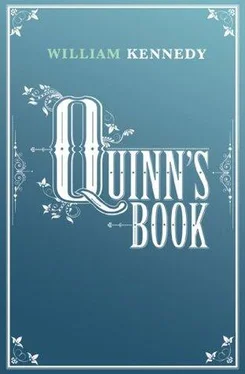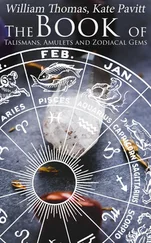“Oh indeed, sir. But my mother is dead and buried too, God rest her soul. And sir, if my voice fails to please you, is there another sort of job here for me?”
“Let us have first things first. What song will you sing?”
“ ‘Kathleen Mavourneen.’ It was my father’s favorite.”
“A lovely song, but very difficult,” said Dorf, and he sat on a chair while I faced the banjo players and others. I then sang, a capella, and very badly indeed, the only song whose words I knew to the end, pounded into my memorious brain by my relentlessly lyrical father. I could see from Dorf’s face that my talent lay in a direction other than music. He was about to tell me as much when a young man in a plug hat and galluses, and only slightly older than myself, joined me in my progress toward a high note I knew I would never hit. His voice overpowered mine with such mellifluity that all in the theater were thrown into a fit of awe. It was the purest voice I could imagine, and what’s more he also knew the words.
Oh hast thou forgotten
How soon we must sever ,
Oh hast thou forgotten
This day we must part.
It may be for years ,
And it may be forever ,
Oh why art thou silent ,
Thou voice of my heart. .
I desisted from singing when he began, but continued humming along somewhat unobtrusively, reluctant to abandon my own song entirely. When the song ended, all in the theater (myself included) burst into applause, so obviously grand and crystalline was the fellow’s talent. He had not been in the theater when I arrived, but must have come in behind me to unite with my song like a usurper. But his usurpation was justified: he talented, I without a shred. He extended his hand to me.
“I apologize for interfering with your song,” he said. “But I saw you were in difficulties. Perhaps if you did a different song. .”
“I don’t know a different song,” I said, shaking his hand.
“That is a pity, then. I’ve ruined it for you.”
“You’ve ruined nothing,” said Dorf, coming between us. “I believe it’s a wonderful act. This lad here with a very small voice, terrified of performing and quite sympathetic for all that, and then you, rising from the audience like the deus ex machina himself and booming out your splendid tenor’s gift. And then, yes. . yes, yes, you climb onto the stage, singing all the while, and the two of you finish together in grand elevation. The lad is rescued, the tenor triumphant. Oh, I’m fond of it, very fond. How do you call yourself, young sir?”
“Joseph K. Moran,” said the usurper.
We all exchanged names and Dorf told us to come for rehearsal tomorrow at ten. He then busied himself with the next aspirants, a pair of twins who had been dancing in the wings to the jangle of their own tambourines when I came in. I discovered that Joseph Moran had just arrived from Utica after visiting his ailing mother. I quizzed him on La Última and he said she’d sold out the theater there for two weeks, as she had here. I inquired after Maud and he vaguely recalled hearing of a young girl who appeared on stage with La Última, but doing precisely what, he could not say. I liked Joseph Moran in spite of his usurping ways. He was only a year older than I, though he looked to be near the age of twenty, and carried himself with a sophisticated swagger I mistrusted without knowing why.
A man entered as we talked and said to Dorf, “I’m looking for a young fellow called Daniel Quinn.” Dorf pointed me out and the man came over to me.
“I’ve a message,” he said in a whisper. “Mr. Staats awaits your visit.”
“Mr. Staats?” I said. “Mr. Dirck Staats?”
“I wouldn’t know that,” said the man. “Staats is all they told me.”
“Who is they?”
“Mr. Staats. He was with others.”
“Where is he?”
“Out the road north. I’m to take you. You’re not likely to find it alone.”
“Is he all right?”
“All right? What constitutes all right in this life?”
“Is he well?”
“He’s among the living, if that’s what you’re asking.”
“Then I think I must go.” I said this more to convince myself than anyone else, but I don’t think I succeeded, for Joseph Moran spoke up.
“Is there trouble? You look worried.”
“Not at all,” I said. “Nothing to be afraid of.”
“Then we’ll meet here in the morning.”
“Ten o’clock,” I said, and went out with the man.
He was the driver of an open carriage drawn by two horses, and I rode alone beside him, staring out at the dismally gray afternoon, seeing the houses move farther and farther apart as we left the city. The trees were in early leaf and the grass was as green as April can make it. We’d had a week of heavy rain and the overcast sky threatened us today as well. We turned off the main highway and onto a narrow dirt road, rutted with mud but navigable with the help of the two animals. Certain wooded landscapes in the distance seemed familiar to me, and then I realized we were nearing the Plum spread. I asked the driver, “Are we going to the Plums’?”
He did not answer. I asked a second time, and a second time won no response. At the road leading into the Plum place the driver stopped. I chose not to move. He was a stringy man of anxious mien, a jittery presence inside his scruffy clothing.
“Up there you go,” he said impatiently, pointing over his shoulder with his right thumb. “In the barn, they said.”
“What’s in the barn?”
“Your friend Staats.”
“Then why don’t we drive to the barn?”
“I go no farther than this,” he said, brushing his lapels with the backs of his fingers. I saw no alternative but to climb down. I stood beside the carriage and looked to the barn, then again to him.
“You’ll wait here for me,” I said.
“I go no farther than this,” he said, and he again brushed his lapels.
I walked toward the barn, looking for signs of Plum people, but saw no one; nor did I see any Plum animals. The horses were gone from the corral, and no cows grazed on the hillside. The barn door stood open, as it had when Will and I last visited. I looked back at the carriage and saw the driver still on his perch, holding the reins, looking straight ahead. I entered the barn cautiously, hearing no sound. I surveyed the interior from one step inside the door, discovering an open area for carriages and wagons, a hayloft, and two dozen animal stalls. I saw no sign of Dirck, and so stepped forward, making silent inquiry to the Deity whether in the next instant I would be exploded by a shotgun blast or impaled on the prongs of a rusty pitchfork.
I found Dirck in the farthermost stall, face down in soiled hay, wearing the same ill-fitting clothes he’d been wearing when abducted. On close look it was not animal droppings but his own blood that had soiled the hay. I rolled him over to see his face and found it a total wound, a horrifying smear of blood, gash, and swelling. His eyes told me he was still alive, but not for long, I judged. I did not know how to help him, but my instinct was to clean his face, find his bleeding and stop it, just as I had aided John the Brawn in conserving what remained of his blood after a street fight.
Dirck gave me recognition with his eyes, then closed them. I thought he’d died but he hadn’t; and on he breathed. I lifted him, found he had no power to stand alone and that I was of insufficient strength to carry him. I ran to the door to call the carriage driver and found the low buzzard had driven off. I felt sure now that no one remained on the Plum place except myself and the bleeding Dirck. I spied a pump near the house, a bucket beside it. I filled the bucket, which leaked, and so ran with it to Dirck. I soaked my shirttail to wash the blood from his face, saw his lower lip was split open at the left corner, and his mouth full of partly clotted blood. I blotted and cleaned what I could, fearful of disturbing any clot, and Dirck made no move except to breathe. It appeared he’d been smashed in the face, so swollen was he. After the cleansing I could see his blood flow was mostly stanched, perhaps by time, or by the downward pressure of his wound onto the straw; and that gave rise to small hope in me. He was, nevertheless, all but dead, and would surely die with thoroughness if I did not find help. What I needed was a horse and wagon, and the Plum barn offered neither. I ran to the house, went ’round it to see what was behind, but found nothing. I peered in a window and saw the house had been emptied of furniture, and I began to understand not only how deeply the Plums had been involved in, but also how radically their lives had been changed by, the events set into motion by Dirck.
Читать дальше












